The “customer journey” is a term that indicates the customer’s trajectory from curiosity to loyalty. Traditionally, it is defined as having five stages: Awareness, Consideration, Decision, Retention, and Advocacy. These stages outline the sequence that a customer travels as they discover, interact with, and connect with a brand.
However, since this pathway is predominantly from the point of view of the customer, what’s missing from most conversations is the enterprise perspective, i.e., what it truly takes to orchestrate this journey.
For enterprises, the customer journey is not a linear path. Instead, it’s a messy, chaotic, and uphill road riddled with friction, inefficiencies, fall-offs, and funnel breakages. Even with the advent of intelligent and powerful technologies like Gen-AI, businesses wrestle with fragmented data, missing context, and a plethora of decision-making bottlenecks.
For example, a case in point is customer service, which is a key enabler in ensuring a positive and rewarding customer journey. Interestingly, Gen-AI-enabled customer service introduces a new era of efficiency and scale, but it also surfaces six profound paradoxes:
- connected yet isolated,
- lower cost yet higher price,
- higher quality yet less empathy,
- satisfied yet frustrated,
- personalized yet intrusive, and
- powerful yet vulnerable.
Not surprisingly, a recent Gartner study revealed that 64% of customers would prefer that companies didn’t use AI for customer service. In fact, most early Gen-AI projects in customer service haven’t delivered the cost savings or customer experience improvements companies had hoped for.
While Gen-AI is an incredible tool in the right hands, context continues to be the missing link in forging data-led customer excellence. In today’s data-saturated business environment, orchestrating an effective customer journey is not just about data access, but the domain-specific, contextual interpretation of that data in real time, and that’s precisely where MecGPT comes in. FORMCEPT’s Gen-AI solution for contextual interpretation of rich, complex, and messy customer data delivers a context-aware customer intelligence layer that turns this noise into a clear narrative, surfacing what matters, when it matters.
In this blog, we will look at each stage of the customer journey from the point of view of the enterprise and explore how contextual data interpretation can pave the way to transform the economics of the modern customer journey.
Stage 1: Awareness
Reaching the Right People the Right Way, With Precision and Scale
The first stage in the customer journey is Awareness. For this, the enterprise must focus on reaching the right audience with precision, at scale, and through the right channels. Cutting through the noise isn't about shouting louder. It's about knowing who to reach, where to reach them, and what message will resonate.
Today, 7 in 10 organizations already use marketing technologies and Gen-AI. Why? Because the returns are undeniable: Gen-AI boosts marketing productivity by 5–15%, unlocking a potential $463 billion annually, according to McKinsey. Yet, most companies still burn cash inefficiently, spending $92 on acquisition for every $1 on conversion optimization, highlighting a stark misalignment in value capture.
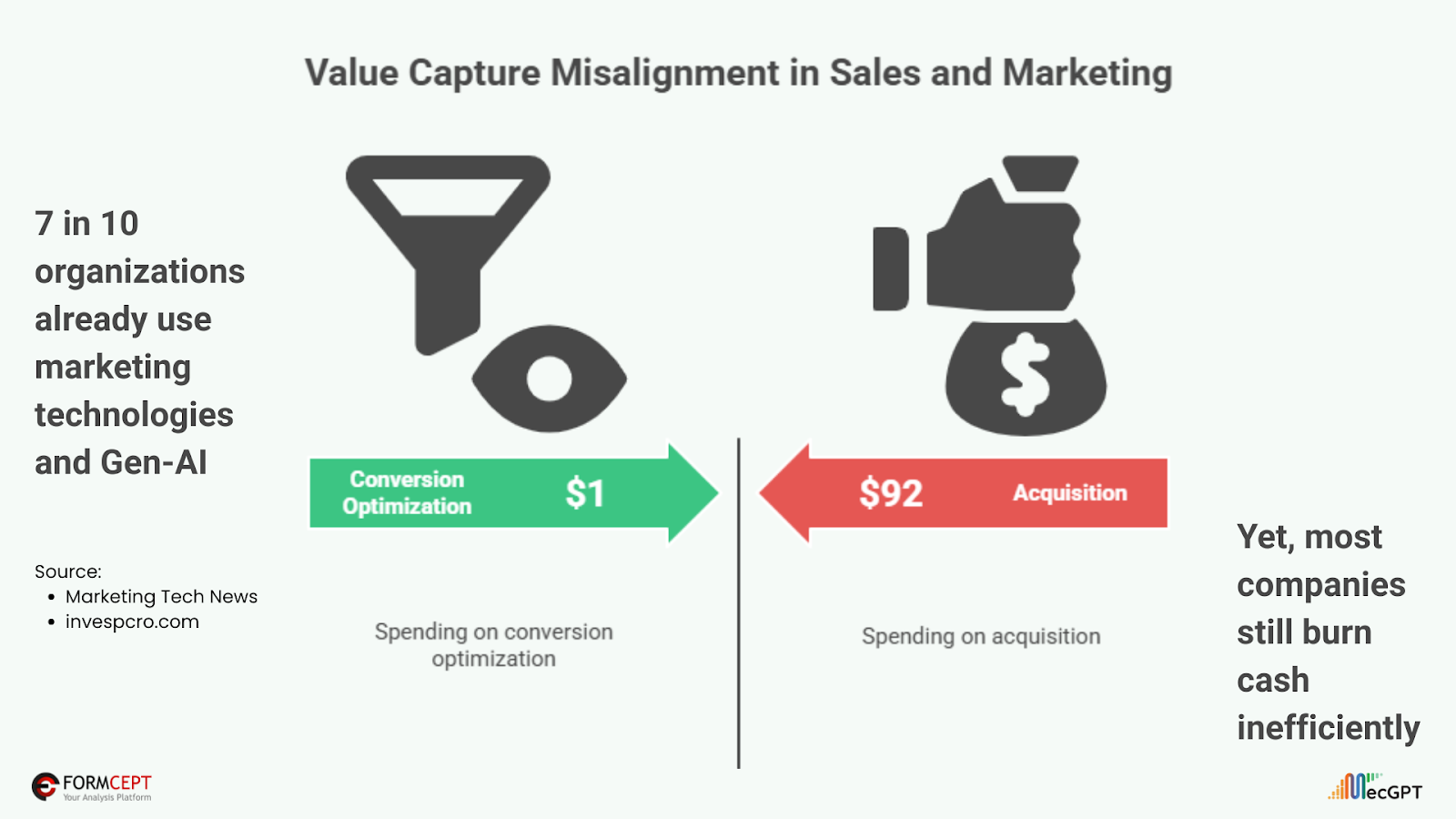
MecGPT addresses this dichotomy like never before. It is backed by MecBrain, a powerful and all-pervasive context engine for all your customer data that seamlessly ingests, unifies, and contextualizes petabytes of cross-channel customer data in real time, irrespective of their source, data type, or underlying structure.
Based on raw inputs like ad performance, brand mentions, social listening, customer sentiments, and CRM signals, it can create intelligent customer segment definitions, in-depth customer 360° analysis, and precision-engineered look-alike profiles for ideal buyer personas in real time, backed by hyper-personalization.
Powered by MecBrain, which provides a structured, domain-driven ontology to accurately map these patterns, MecGPT delivers actionable, goal-specific insights, such as:
- Which campaigns to double down on?
- Which audiences are experiencing content saturation?
- Which stories are gaining rapid traction? – and so on.
It knows what content customers consume, what they’re curious about, where they visit, what competitors they respond to, and even which competitor Marketing strategies have worked—and why.
It’s not marketing anymore. It’s contextual micro-targeting, guided by domain-driven, goal-based orchestration.
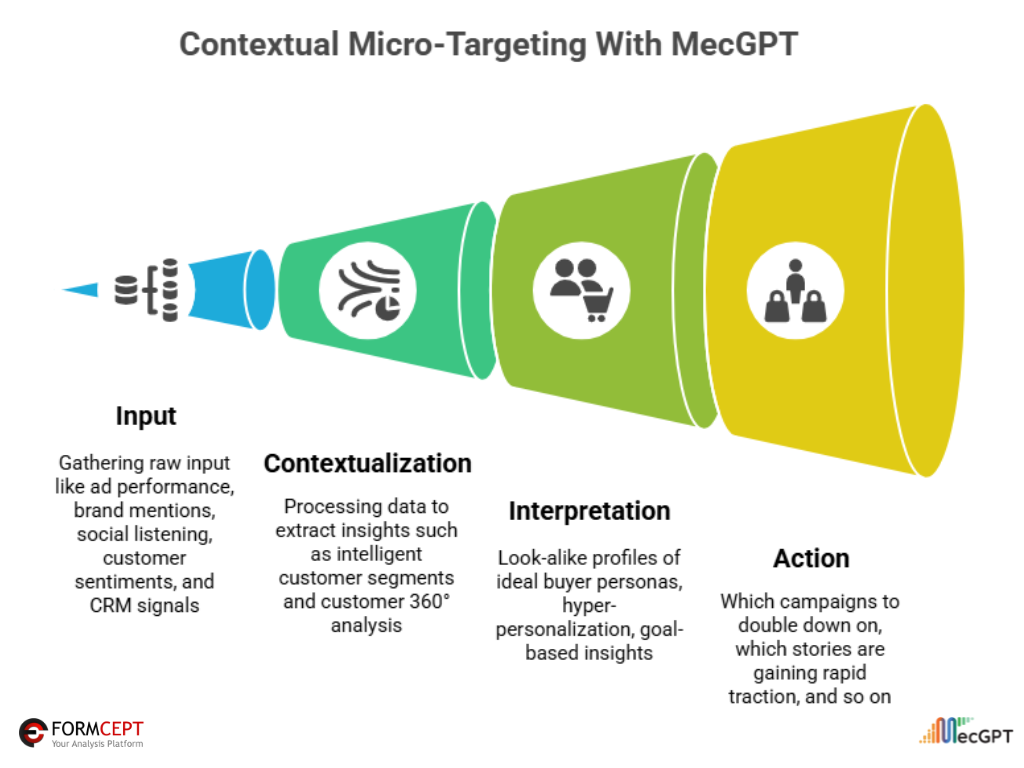
Stage 2: Consideration
Captivating and Engaging Customers With Omnichannel Storytelling
Once attention is earned, interaction must follow, and it must feel seamless, human, and emotionally intelligent. That’s where storytelling becomes a superpower for enterprises.
Data tells us:
- Stories are remembered 22x more than just facts.
- Storytelling can increase conversion rates by 30%.
- While people remember just 5–10% of pure data, they retain 65–70% of narrative-driven content.
The science is clear here: contextual storytelling beats dry, fluffed-up content, every time.
The results speak for themselves: companies using generative storytelling frameworks saw 5% higher sales productivity, 6% greater customer satisfaction, and 7% lower overhead costs.
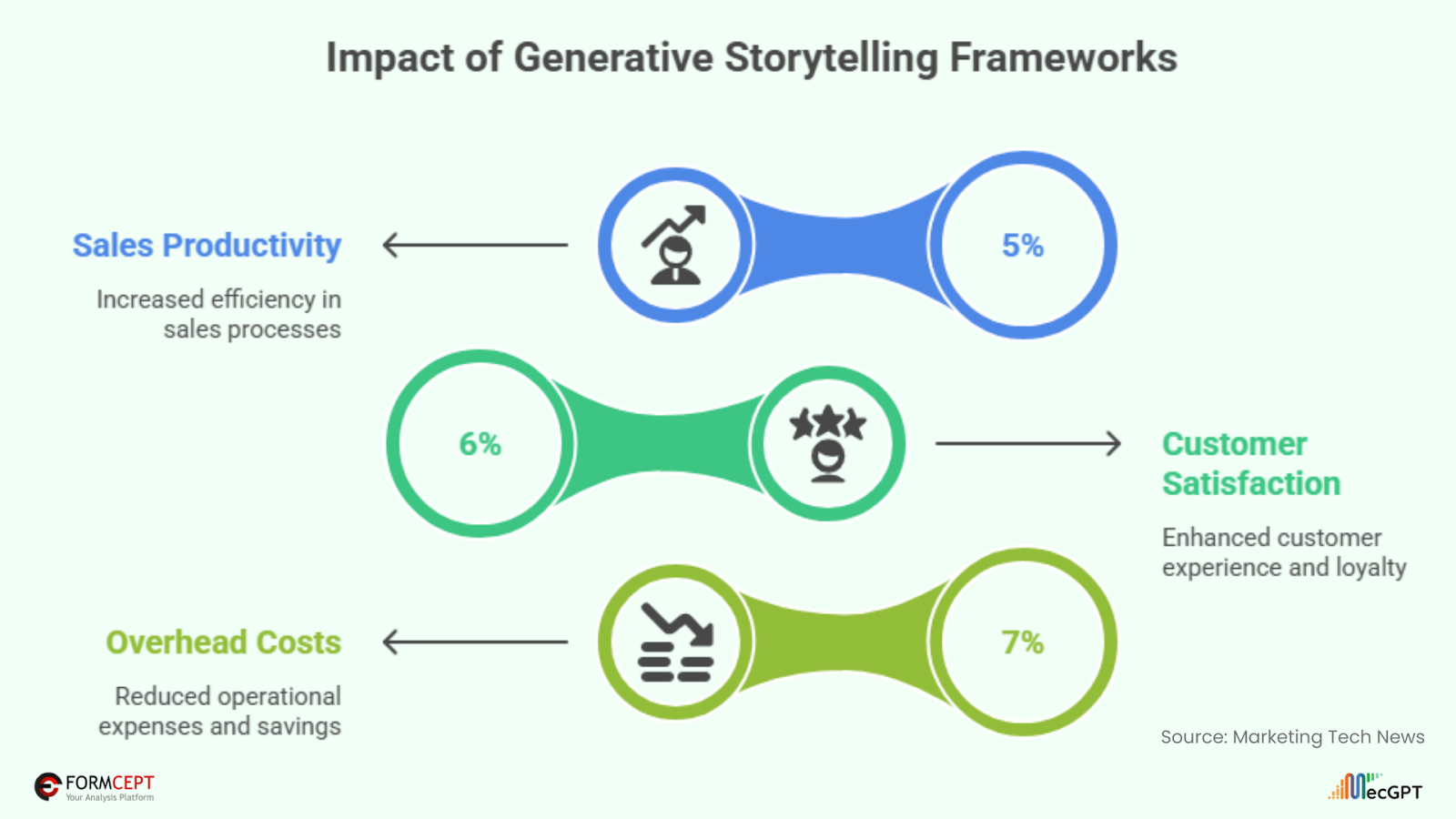
MecGPT walks the extra mile in this regard with its in-depth domain understanding and a unique use-case-driven approach. It powers contextual storytelling across every touchpoint—email, paid social, landing pages—tailored not just to a segment or a persona, but to a contextual moment in the underlying customer journey.
- Is the user comparing prices?
- Is the user curious about product reviews?
- Is the user getting swayed by competitor messaging?
MecGPT knows the answers to questions like these—and adapts in real time. By dynamically interpreting which topics customers are curious about, what they are discussing, and what aspects competitors are exploiting, it helps craft adaptive narratives that evolve with the market pulse.
But developing narratives is just one half of the battle. Optimizing channel economics is an equally important Marketing imperative to drive engagement. For example, the top ROI channels for B2B brands in 2025 are websites, SEO blogs, and paid social. For B2C brands, email marketing, paid content, and mobile-first experiences are driving conversions.
Hence, Marketing success in today’s age is all about building a robust omnichannel presence, and MecGPT allows businesses to orchestrate omnichannel storytelling not just with hyper-relevance but with deep emotional resonance, grounded in domain expertise. After all, what works for an insurance buyer is likely to fail miserably for a movie buff!
Stage 3: Decision
Conversion, Sales, and Onboarding
Despite rising traffic, only the top 10% of websites convert above 11%. The average sits below 3%, and two-thirds of marketers admit their landing pages convert under 10%. Because most journeys stop at the click, they don’t translate intention into action.
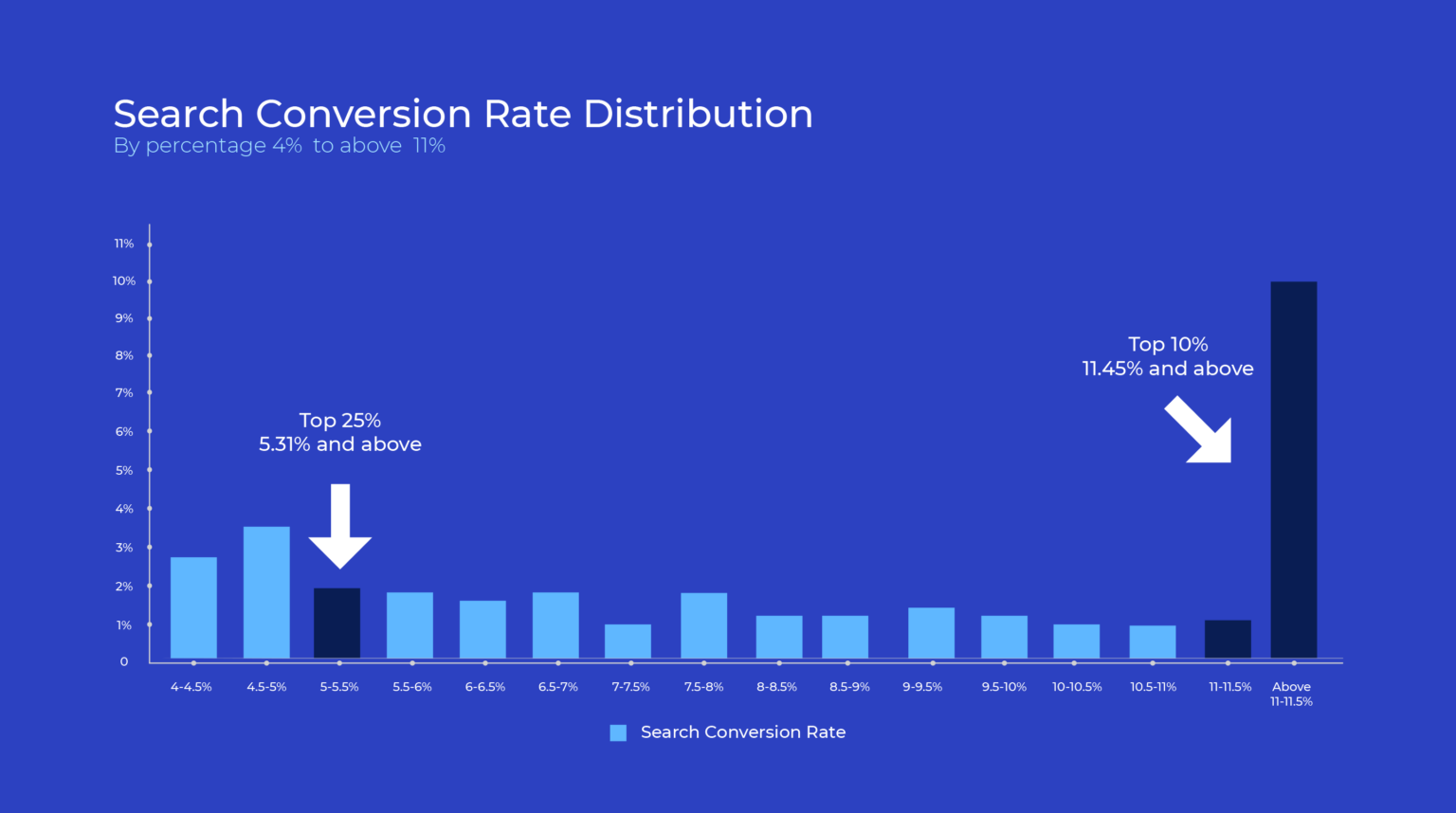
Image Source: https://www.invespcro.com/cro/statistics/
Against this backdrop, Conversion Rate Optimization (CRO) is no longer about guesswork. It’s a science. With the CRO software market projected to hit $5 billion by 2025, it’s clear that businesses are waking up to this.
MecGPT enables a data-first, test-and-learn model at scale that can identify conversion bottlenecks, test hypotheses dynamically, and deploy personalized variations to the right cohorts. In the background, MecBrain ensures that these insights are anchored in the domain context. What works for B2B SaaS customer onboarding won’t work for e-commerce flash sales, for example. This contextual anchoring is what drives results, not just clicks.
MecGPT doesn’t just fuel CRO, it designs and delivers precision moments of influence. For example, to come up with recommendations for the next best steps, it can incorporate the latest insights such as:
- Companies that integrate user-generated content (UGC) see conversion lifts of 102% when users actively engage with it.
- E-commerce product reviews alone can increase purchase likelihood by 270%, and for big-ticket items, by a whopping 380%.
Even subtle psychology matters: for example, MecGPT can understand e-commerce nuances such as products rated between 4.0 and 4.7 stars convert best. A perfect 5.0 rating? Ironically, it triggers skepticism.
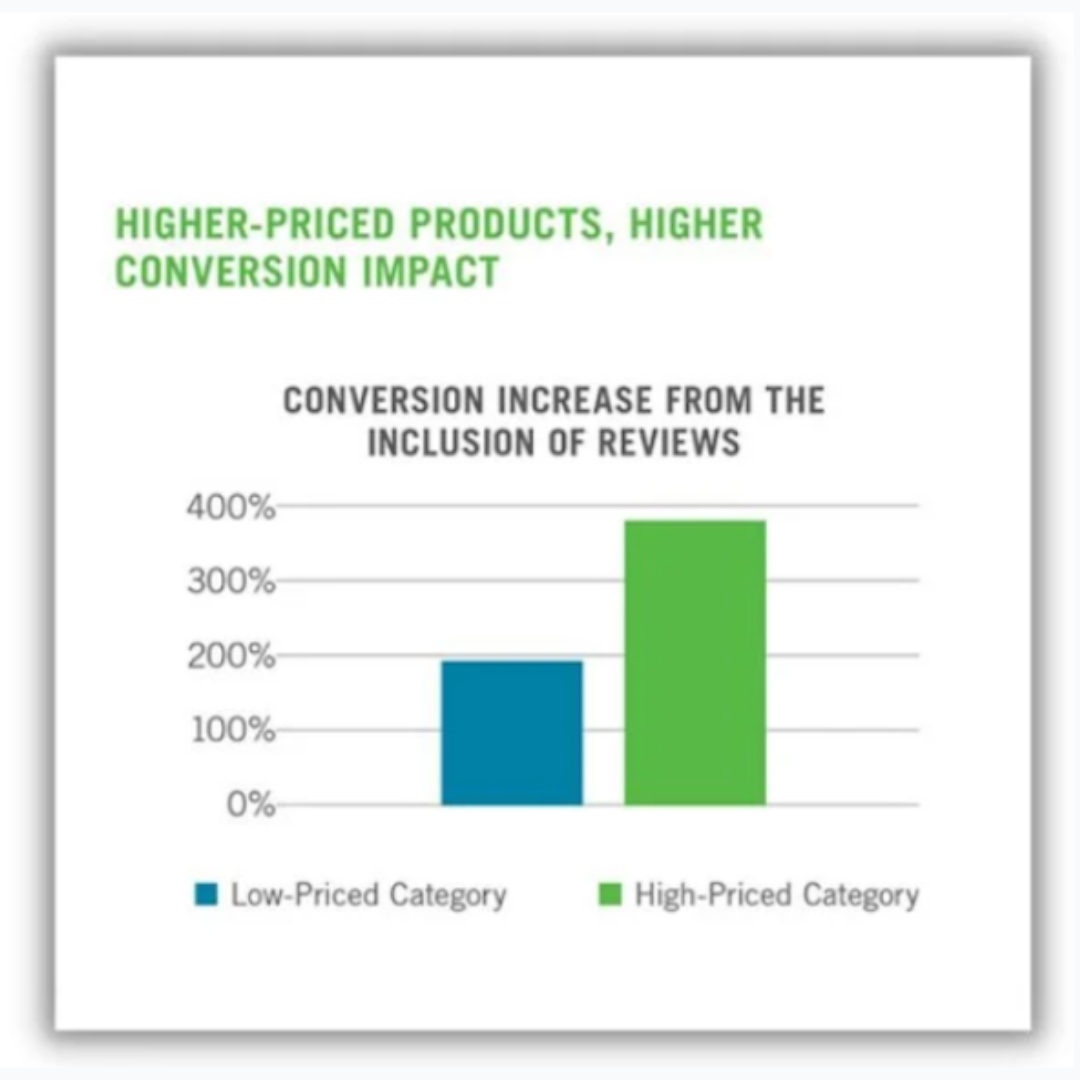
Image Source: https://www.wordstream.com/blog/conversion-rate-optimization-statistics
Stage 4: Retention
Turning One-Time Buyers into Lifetime Customers
Retention isn't just about discounts anymore. It’s about dynamic loyalty loops targeting the right customer, at the right time, with the right trigger, and a clear, data-led strategy for churn rate optimization.
Consider this:
- It costs 5–25x more to acquire a new customer than to retain an existing one.
- 60–70% of upsell chances come from existing users vs. just 5–20% for new leads.
- A 5% increase in retention can raise profits by 25%.
- And 65% of revenue typically comes from repeat customers.
But the risk of churn rate spinning out of control is real as well:
- 76% of global consumers will leave a brand after just one bad experience.
- 95% of them will tell others about it.
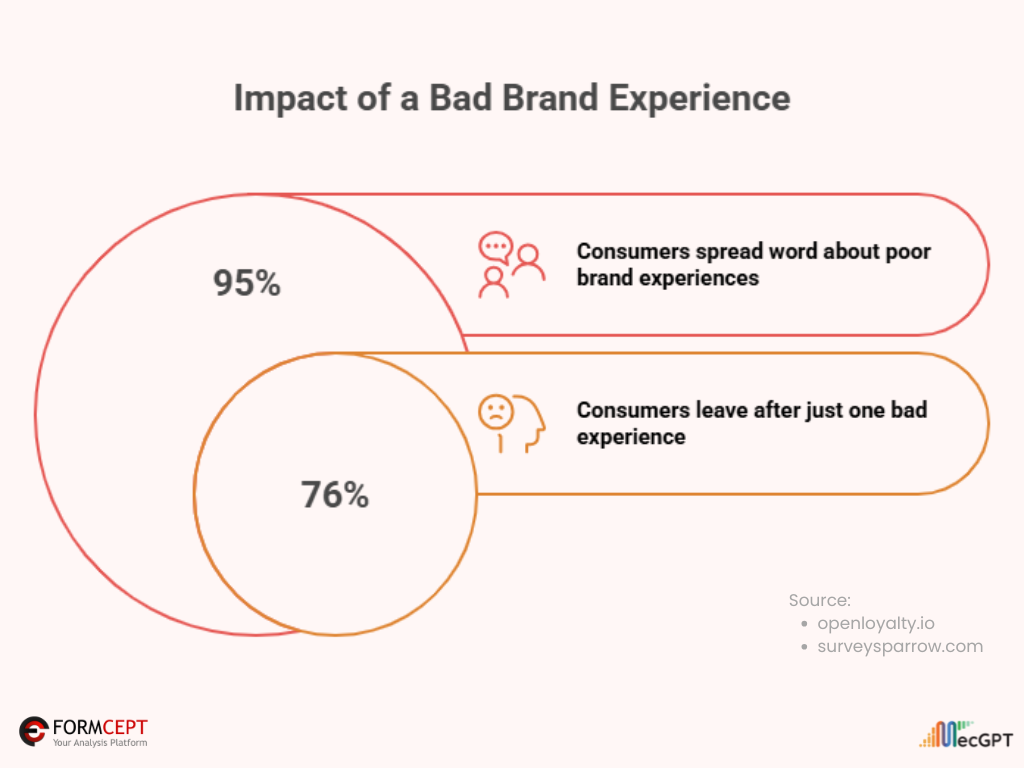
MecGPT anticipates churn before it happens. It analyzes not just NPS data or support tickets, but emotional cues across chat, reviews, and the entire customer-brand interaction spectrum. Paired with MecBrain’s domain-aware semantic knowledge graph, it orchestrates interventions that are context-specific: an upsell to one customer and a re-engagement campaign to another.
This is next-gen personalization-at-scale—a strategy not just for satisfaction, but deep emotional connection and unflinching loyalty. Even 53% of “silent loyalists” (repeat buyers who don’t engage with the brand) can be activated through MecGPT’s contextual engagement model.
What’s needed is a seamless retention engine powered by predictive, context-aware Gen-AI. MecGPT interprets every signal, and with MecBrain’s domain-rich insight, it knows what the warning signs mean in your vertical—whether you're in fintech, retail, SaaS, or healthcare.
Stage 5: Advocacy
Fuelling Growth with Customer Champions
Great customer journeys end in advocacy, but only if they transform disconnected touchpoints into well-knit, high-value experiences. Gen-AI isn’t just about automation; it’s about empathy at scale. That’s the difference between a generic bot and hyper-specialized MecGPT agents with deep vertical IQ and emotional resonance.
MecGPT analyzes support transcripts, reviews, and voice-of-customer data to predict when customers are ready to refer or review. It then activates the appropriate journey—whether it's sending a referral reward, escalating to a human success manager, or prompting UGC (user-generated content) submission.
This way, it powers automated customer success workflows and turns them into success stories that enterprises can leverage.
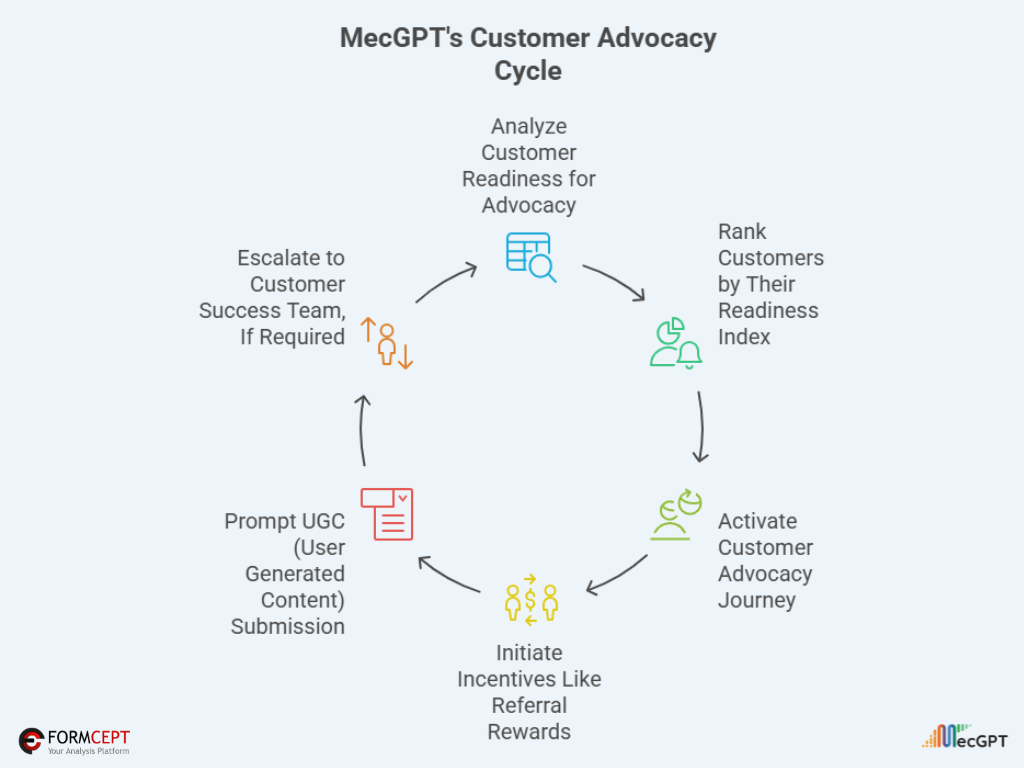
Final Thoughts: From Data to Differentiation
In a world of infinite signals and limited time and attention, context is the new moat. Businesses that treat the customer journey as a static funnel will be outpaced by those who interpret it as a dynamic, multi-dimensional experience, driven by Gen-AI that understands the business domain with human-like depth and contextual reasoning.
MecGPT brings this to life. It doesn’t just surface insights—it turns them into actions, intelligently orchestrating the entire customer lifecycle. With MecGPT, the customer journey is no longer a funnel. It’s a flywheel, powered by contextual intelligence, precision execution, and domain-driven understanding of the subtlest nuances.
Learn more: https://www.formcept.com/mecbot-modules/mecgpt


.png)


.png)





